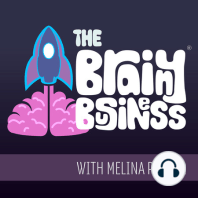50 min listen

176. Reframing Annoying Disruptions to Support Innovation, with Adam Hansen, coauthor of Outsmart Your Instincts
FromThe Brainy Business | Understanding the Psychology of Why People Buy | Behavioral Economics
176. Reframing Annoying Disruptions to Support Innovation, with Adam Hansen, coauthor of Outsmart Your Instincts
FromThe Brainy Business | Understanding the Psychology of Why People Buy | Behavioral Economics
ratings:
Length:
50 minutes
Released:
Oct 29, 2021
Format:
Podcast episode
Description
Have you ever had a disruption in your routine – moving to a new house, taking a new route to work – and found yourself exhausted every day? This is common when our habits are upended (the subconscious can’t use its rules anymore so your conscious is having to do a lot more work!). And while it may feel annoying, this is also a great opportunity to innovate and change your life for the better. Today, I’m joined by Adam Hansen, VP of behavioral innovation at Ideas To Go and coauthor of Outsmart Your Instincts who happened to be in the midst of a move, so we talk about how to reframe an annoying disruption in habits to make it work for you. We also discuss the curse of knowledge and how it impacts businesses, risks of omission versus risks of commission, and other fun behavioral goodness sprinkled throughout (including my new favorite term of being an “omnivore of information”). Listen now... Show Notes: [00:07] In today’s episode, I’m excited to introduce you to Adam Hansen, VP of behavioral innovation at Ideas To Go and coauthor of Outsmart Your Instincts. [03:18] Adam shares about himself and his background. He always knew that innovation would be part of his career. [05:18] When working on the book, they started looking at all the cognitive biases to figure out which ones were causing most of the mayhem in innovation. [06:16] If you adopt the behavioral innovation approach, you can see three to four times improvement in performance and quality of ideas very early on in innovation. You can get to better ideas faster. [09:01] All of the thousands of small decisions we make every day that have been automated are lost when you move. Each little thing is so minor that we don’t realize what the cumulative effect of all those small decisions is. [10:02] It is important for us to automate everything we can. [12:19] It is impossible for us to place ourselves fully back in the shoes of our first-time clients. Our version of dumbing things down to meet them where they are is still going to be more advanced than where we need to get to. We can work on this by following up with first-time clients and asking what you could have done better. [13:46] There is so much more jargon in your business than you think there is. [16:10] Our need for tangibility is much greater than we assume. Most people need help to break down abstraction. The more tangible you can be the better. [18:13] The curse of knowledge is the idea that once you become knowledgeable in a given area, you can't unknow what you know and you can’t fully place yourself back in the shoes of the subject. [23:27] Negativity Bias is the idea from our ancestors of thinking of all novelty as threat and not opportunity. [25:12] Especially in innovation, we need to be as opportunity minded as possible. We need to be aware of threats and take smart action to minimize and mitigate those threats. [27:43] When we are in moments of threat, to still be able to take swift decisive action is fantastic (and sometimes life-saving!) [28:29] The research shows that negativity can appear super profound. Too often we are shooting down ideas and not coming up with alternatives. That is not progress. [30:31] We are predisposed to go toward the negative any time a new idea comes up. [31:38] The more you can value ideas early on for their provocative value rather than for their immediate merits the better. Then you are in a better frame of mind to take on the negatives. [33:54] When you approach challenges to problems in this way, there is real value. The language is brilliant, priming to get people to deal with problems and concerns in a much better way. [35:10] If you are an optimistic person it doesn’t mean that you don’t have a negativity bias and pessimistic people still have optimism bias. [36:44] Go in understanding that there will be some differences and then the task becomes “How do we get the most out of the differences?” The more you can approach differences with curiosity th
Released:
Oct 29, 2021
Format:
Podcast episode
Titles in the series (100)
21. Habits: 95% Of Decisions Are Habitual - Which Side Is Your Business On?: Habits are much more powerful than most of us realize. This behavioral economics podcast is about habits and habitual buying. It is another one of my behavioral economics foundations podcasts. When a lot of us think of habits, we focus on bad habits,... by The Brainy Business | Understanding the Psychology of Why People Buy | Behavioral Economics